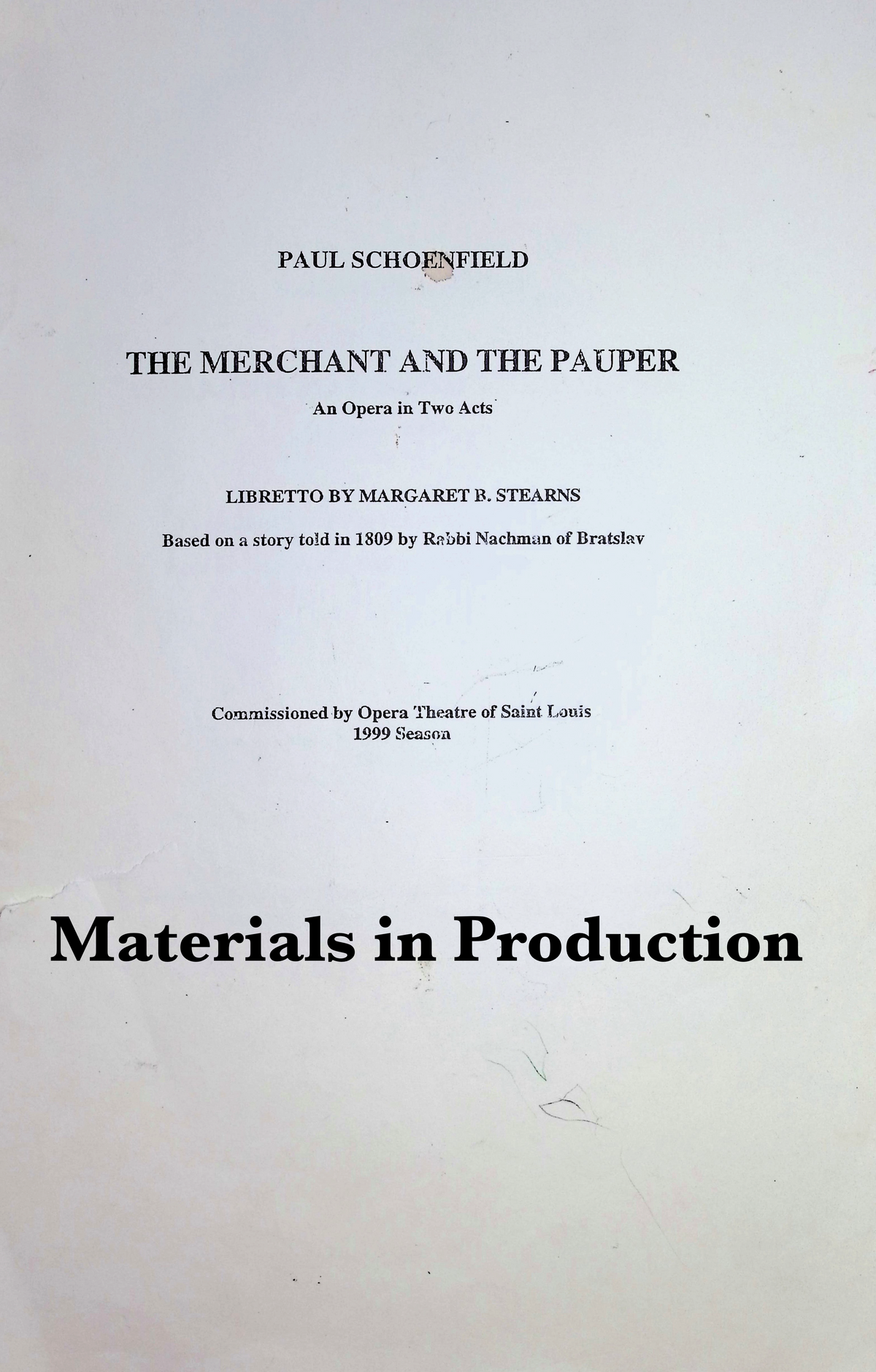The Merchant and the Pauper – Paul Schoenfield
- Regular
- $0.00
- Sale
- $0.00
- Regular
- Unit Price
- per
Materials under production. – More info to be added If you would like more information, please contact us.
Schoenfield’s two-act opera, The Merchant and the Pauper, was commissioned by the Opera Theatre of Saint Louis and given its premiere there in 1999. Its libretto is adapted from a tale fashioned and first told in 1809 by one of the most significant personalities in Hassidic history, philosophy, and lore—Reb [Rabbi] Naḥman of Bratslav (1772–1811), the founder of the Bratslaver Hassidic sect.
Synopsis (by: Neil W. Levin)
Act I
The Pauper’s beautiful wife is kidnapped by a “wicked” general, but she is rescued and returned home by the honorable Merchant. The Merchant and the Pauper are both rewarded with the birth of children—a son to the Merchant and a daughter to the Pauper. The Pauper’s daughter is uncommonly beautiful—considered “the most beautiful child on earth.”
The two children are promised to each other for future marriage by their parents. Over the years, the Pauper’s daughter, Beauty, becomes the means to his increasing wealth and power, since he prospers when people bestow gifts upon her, and his social as well as economic rank expands as noblemen vie for her as a bride for their sons. The Pauper, whose greed increases accordingly, eventually becomes emperor of the entire land, and now he is determined that his daughter must make a noble marriage rather than marrying the Merchant’s son, as promised. The Pauper’s wife, however, refuses to acquiesce in breaking their promise, and by that time the children also feel committed to each other as predestined partners.
The Pauper therefore conspires to bring ruin upon the Merchant by spreading false rumors of fraud, which then reduce him to poverty. Even then the Pauper’s wife and daughter remain committed to the promise, so he orders his men to abduct the Merchant’s son, put him in a sack, and throw him into the sea. But the Merchant’s wife clandestinely manages to have a convicted criminal put in the sack instead, and the Merchant’s son escapes through a fierce storm at sea.
Act II
The Merchant’s son is shipwrecked on the shore of a wild land that is uninhabited by humans. He and Beauty have pledged to each other that wherever each one happens to be, they will both observe the evening star each night as it rises out of the sea. Thus, no matter where they are, they will be able to see into each other’s hearts.
The Pauper assumes that the Merchant’s son is dead, in which case his daughter is no longer betrothed. She can now receive other suitors, but she is veiled in order to prevent them from fainting at the sheer sight of her unequaled loveliness. Beauty is abducted and carried off by an evil pirate who plans to sell her for ransom. He has lured her onto his ship, tempting her with mechanical golden birds that sing and dance. Once again a fierce storm arises at sea, and they are shipwrecked on the same shore where the Merchant’s son is living. The wild animals there have ignored him, but they seize upon the pirate and tear him to pieces.
Meanwhile, chaos reigns in the emperor’s palace. The nobles now realize that without his daughter, the Pauper turned emperor is no longer of any use to them. The places of the Merchant and the Pauper are once again reversed. The Merchant is restored to his former prosperity and high social standing, and the emperor returns to poverty. But the Pauper’s wife becomes the empress in his place.
Since so much time has passed since their separation, Beauty and the Merchant’s son do not immediately recognize each other on the wilderness shore. But when he tells her his story, they become reunited, returning home to rule over the kingdom—“to everlasting joy.”
Read more at: Milkan Archives

